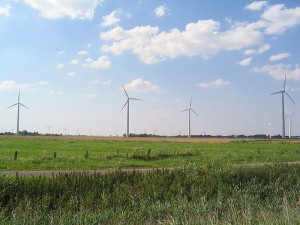One of the largest conflicts that we are faced with today is how to create efficient clean energy, and reduce the ecological footprint we leave on earth. Germany has been working on this challenging adjustment since 1991. This country has proven to be an exceptional role model for the change that many hope to see in the world.
The transformation of Germany’s energy sector has taken place for many years now. However, this “energy turn” has shown to be successful from the years active, along with being interesting and exciting. Hardy Graupner stated in “What exactly is Germany’s ‘Energiewende’?” “The government made it clear that it would stick to the objective of reducing greenhouse gas emissions by 40 percent by 2020 (compared with 1990 levels) and by 80 percent by 2050.”
Germany is exceeding any other industrialized nation by vetoing nuclear power plants, and taking advantage of renewable resources. The best alternative in Germany to nuclear power is wind energy. Gero Rueter exemplified in his article “Wind Energy Blowing Away Nuclear Power” on dw.com
“Wind energy supplies 3 percent of global electricity needs and will soon supply more electricity than nuclear power. In 2011, some 50 billion euros were invested in wind, leading some to say it’s cheap and creates jobs. By 2020, the share of wind energy will have risen to between 20 percent and 25 percent in Germany, according to estimates”
This milestone in German innovation has set an example for environmental responsibility, and is a plan that other industrialized countries should start to take part in. Overall, the successful energy revolution that Germany has accomplished demonstrates how possible sustainability can be in other parts of the world.
Sources:

Erin, Do you think Germany will continue to hit their target goals for renewables (35% renewable by 2050), even as the effects of these policies on industrial earnings are becoming more controversial? Despite the cooperation that got these policies ratified, it seems the nuclear v. anti-nuclear is becoming more polarized.
Erin,
I agree that Germany has displayed a great amount of environmental responsibility in their effort to create widespread clean energy. But don’t you think it is a little too obsessive? True, they created a plethora of jobs for German citizens, but they are also outraged by the soaring prices in their electric bills. This is a result of phasing out nuclear power and mandating renewable energy. Consumers in Germany are facing the biggest electricity price increase in a decade and those price increases will continue. About 800,000 German households can no longer pay for their energy bills. I can appreciate their sense of urgence of creating a better world for the future, but do today’s citizens deserve such retribution? I think they should slow down a bit and take their people’s well-being into consideration, or else there will be no future…
Erin, I woud like to start off by saying that this was very well written and your elaboration of how much of a succes this energiewende is for Germany is fantastic. Germany is moving forward on a policy that no other country in Europe have thought of, cutting back from other main resources of energy to move to renewable energy world. However, do you not believe that this is causing problems for the citizens for Germany? Many citizens can no longer afford to pay for the electricity bill, while providing for their families. How long will it be before the German government does something about this?
You do a very good job of explaining the method Germany plans to take to remove them selves from nuclear power plants, and how great the idea is. But the question I have for you is how is Germany going to pay for all of this? Will it work out for them or is it going to put their country into debit? Also do you see Germany actually being able to fulfill their goals of producing 80% of renewable resources?
Erin, even though I feel that your blog is well written and everything that you have said about Germany’s renewable energy projects is correct, I feel that you have neglected to mention the issues that the Germans are facing in these projects for example the greatest concern the instability of their power grids that is being caused by the fluctuation of voltage caused by wind powered turbines or the fact that Solar and Wind energy are largely seasonal and Germany sees a slump in energy production in the winters producing too little while summers see wind turbines working in over drive creating huge excesses of electricity.
In my opinion you did a great job on the research of Germany’s green energy policy, the stats were intreresting to read. Also, do you think that Germany’s green energy policy will somehow help to decrease the Global Warming.
Erin,
I would like to start by saying that this blog has been very clearly and informatively written, allowing the reader to quickly be informed about Germany’s green policy. It is helpful when facts such as, “The government made it clear that it would stick to the objective of reducing greenhouse gas emissions by 40 percent by 2020 (compared with 1990 levels) and by 80 percent by 2050,” because it gives the reader not only information about the upcoming years but a plan for the long run. Well done.
METHYL 7- 5-OXOCYCLOPENT-1-ENYL HEPTANOATE sigma – Alfa Chemistry offers an extensive catalog of lipids in a wide range of applications. Products listed on our website are either in stock or can be resynthesized within a reasonable time frame. In stock products can be shipped out within 3-5 business days upon receipt of customers’ purchase order.